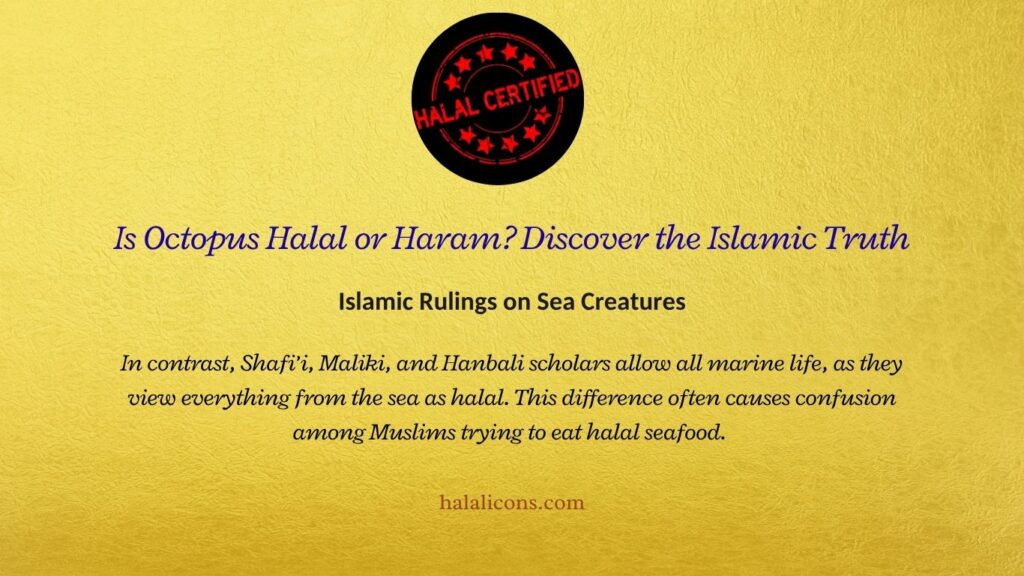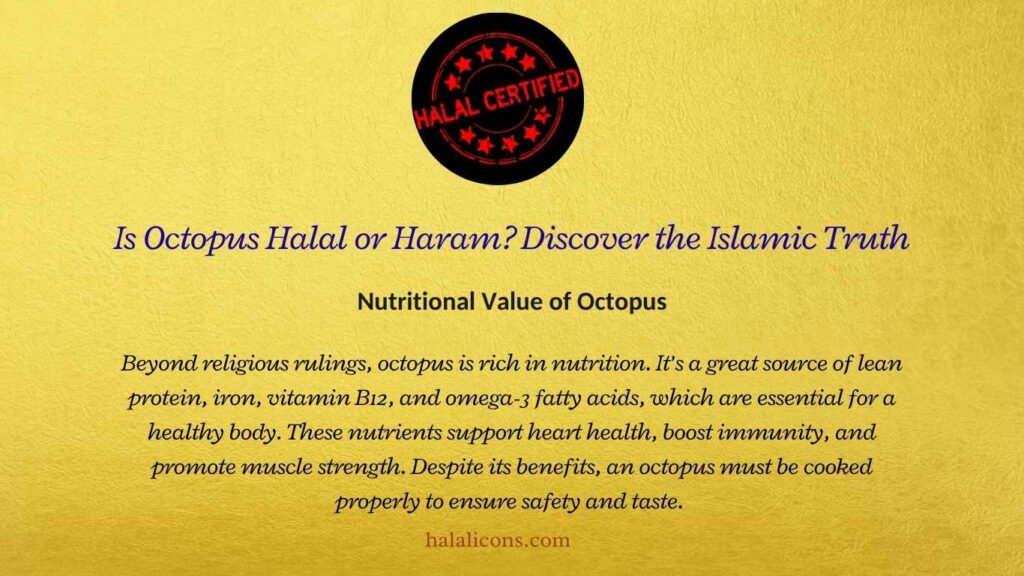For many Muslims, understanding whether certain seafood is halal or haram can be confusing — and octopus often tops that list. So, is octopus halal to eat in Islam? The answer depends on how different schools of Islamic thought interpret seafood under halal dietary laws.
While some scholars consider all sea creatures permissible, others, particularly within the Hanafi fiqh, have stricter views.
This article explores the Islamic perspective on eating octopus, analyzing scholarly opinions, Quranic references, and halal seafood guidelines to help you make an informed choice based on authentic Islamic teachings.
Islamic Rulings on Sea Creatures

Islamic dietary laws vary across schools of thought when it comes to sea creatures. The Qur’an mentions that seafood is generally lawful, but interpretations differ. The Hanafi school permits only fish, excluding creatures like octopus, crab, or lobster.
In contrast, Shafi’i, Maliki, and Hanbali scholars allow all marine life, as they view everything from the sea as halal. This difference often causes confusion among Muslims trying to eat halal seafood.
Therefore, understanding which school of thought you follow is essential before consuming octopus or similar creatures. The rulings stem from how scholars interpret verses about “game from the sea” and the Prophet’s guidance on seafood.
You might also like: Are Chetoos Halal?
What Makes a Seafood Halal or Haram?
Seafood is considered halal when it aligns with Islamic dietary principles — meaning it comes from a lawful source and does not cause harm. According to most scholars, sea animals are generally permissible since the Qur’an allows “what is caught from the sea.”
However, some classify certain creatures, like octopus or shellfish, as questionable due to their non-fish nature. The Hanafi school especially limits halal seafood to true fish species. For other scholars, the condition is simple — as long as the creature lives in water and is not harmful or impure, it’s halal. Understanding these principles helps clarify why there’s debate over octopus.
Is Octopus Halal According to Hanafi Fiqh?
In Hanafi fiqh, only fish are considered halal, meaning octopus does not fall under this category. Since an octopus is not a fish but a marine mollusk, it’s classified as makruh (disliked) or haram (forbidden) by most Hanafi scholars.
This ruling comes from the principle that only creatures explicitly described as fish are lawful. Therefore, even though the octopus lives in water, it’s not permissible under the Hanafi school.
However, other schools — like Shafi’i and Hanbali — have broader interpretations, considering it halal. This difference shows how Islamic rulings depend on each madhhab’s understanding of what counts as lawful seafood.
Views from Other Islamic Schools
Outside the Hanafi school, most scholars have a more lenient stance. Shafi’i, Maliki, and Hanbali opinions agree that all sea creatures are halal, as supported by Quranic verses permitting “game from the sea.”
They argue that since an octopus lives entirely in water, it should be lawful for consumption. Many Islamic scholars also emphasize that there’s no explicit hadith forbidding the octopus.
This broader view simplifies things for Muslims who follow these schools — they can enjoy octopus as part of halal seafood. Still, Muslims from different traditions may choose to avoid it out of caution or respect for their madhhab’s rulings.
Nutritional Value of Octopus

Beyond religious rulings, octopus is rich in nutrition. It’s a great source of lean protein, iron, vitamin B12, and omega-3 fatty acids, which are essential for a healthy body. These nutrients support heart health, boost immunity, and promote muscle strength. Despite its benefits, an octopus must be cooked properly to ensure safety and taste.
Many cultures include it in grilled or boiled dishes, making it a global seafood favorite. However, for Muslims, the nutritional benefits matter only if it’s halal according to their beliefs. Thus, before eating, one should verify its permissibility under Islamic guidelines.
You might also like: Is Wingstop Halal or Haram?
Final Verdict — Is Octopus Halal?
So, is octopus halal or haram? The answer depends on which Islamic school of thought you follow. According to Hanafi scholars, octopus is not halal since it isn’t classified as fish. But for Shafi’i, Maliki, and Hanbali followers, it’s halal as all sea creatures are permissible.
If you’re uncertain, consult a trusted scholar or follow the ruling of your madhhab. The key is to eat with taqwa (consciousness of Allah) and seek clarity from authentic Islamic sources.
Whether halal or not, understanding the reasoning behind these rulings strengthens one’s faith and ensures mindful eating according to Islamic values.
FAQs About Octopus and Halal Seafood
1. Is octopus halal to eat in Islam?
It depends on the Islamic school of thought. The Hanafi madhhab considers octopus haram, while Shafi’i, Maliki, and Hanbali scholars permit it as halal seafood.
2. Why do Hanafi scholars consider octopus haram?
Hanafi scholars classify only true fish as halal. Since an octopus is a mollusk and not a fish, it’s considered non-permissible under Hanafi fiqh.
3. Is octopus halal according to the Quran?
The Quran allows “what is caught from the sea,” but interpretation varies. Some scholars apply this verse broadly, while others restrict it to fish only.
4. What is the ruling of the octopus in Shafi’i fiqh?
According to the Shafi’i school, all marine creatures are halal, so octopus is permissible to eat.
5. Can Muslims eat octopus in non-Muslim countries?
Yes, as long as it’s considered halal by their school of thought and the octopus is not mixed with haram ingredients during preparation.
6. Is squid halal like octopus?
Yes, the same rulings apply. Squid, like octopus, is halal in Shafi’i, Maliki, and Hanbali schools but not in Hanafi fiqh.
7. Is it haram to eat seafood that isn’t fish?
Not for everyone. Most Islamic schools allow all sea creatures, but the Hanafi madhhab limits it to fish only.
8. Does eating octopus break halal dietary rules?
Only if you follow the Hanafi school. For others, it’s completely halal as it’s a sea creature.
9. Is an octopus healthy to eat?
Yes, octopus is high in protein, vitamins, and omega-3 fatty acids. It’s a nutritious choice if halal for your school of thought.
10. What should I do if I’m unsure whether octopus is halal?
If you’re uncertain, it’s best to seek guidance from a reliable Islamic scholar or avoid it to stay on the safe side (taqwa).
Fahad Ali is a youth mentor and social activist committed to empowering the next generation of Muslims. By addressing contemporary issues through an Islamic perspective, He guides young minds in navigating faith, identity, and personal growth in today’s world.